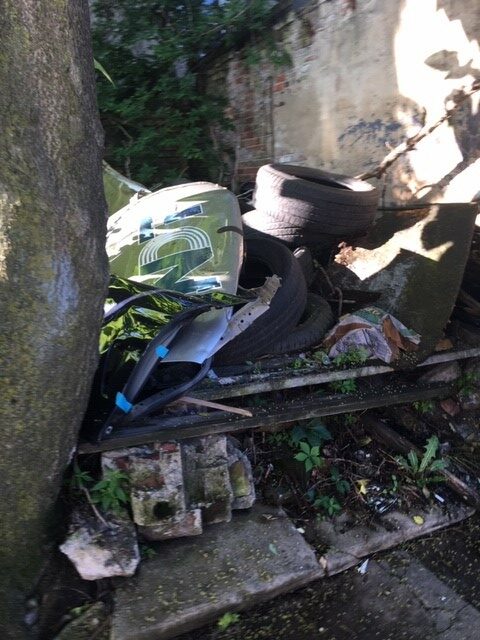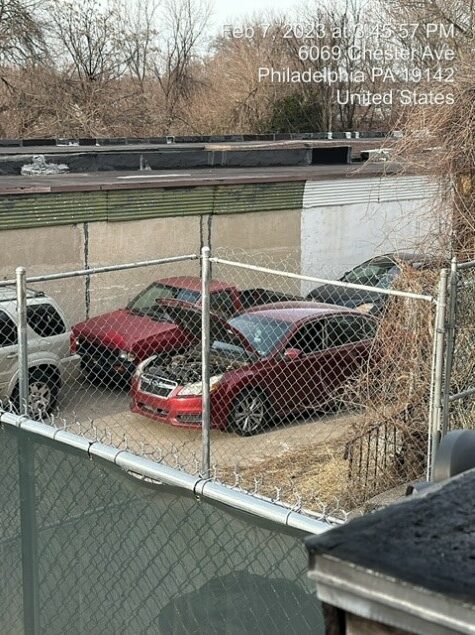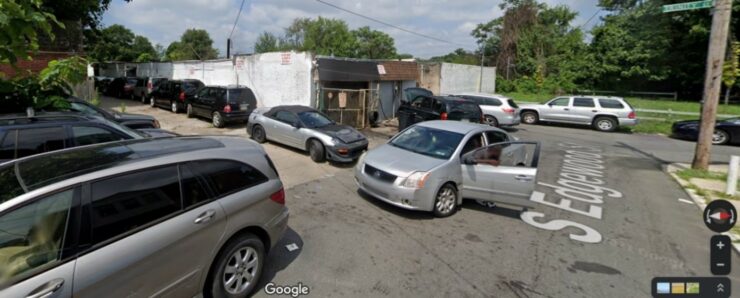April 26, 2023 — A concentration of auto body repair shops plague Southwest Philadelphia, presenting myriad environmental hazards. The City’s Department of Licenses and Inspection (“L&I”) attempts to sanction the businesses’ dangerous and unlawful behavior through inspections, violations, and fines, but enforcement remains elusive. L&I struggles to ensure compliance with the City Code, and owners appear to just budget fines into their business plans. The result is a community where toxic fumes, deafening noises caused by welding and dismantling vehicles, cars in various states of disrepair blocking streets and sidewalks, and hazardous fire conditions are the norm.
The rear of Ramona Bell’s, Rodney Bell’s, and Marceline Dix’s homes share an alley with a sprawling auto body business in the middle of their dense Southwest Philadelphia residential neighborhood. For years, operations at the property have disrupted their daily lives and the lives of their neighbors.
The shop litters their neighborhood, their shared alley, and even their backyards with junked cars, trash, tires, oilcans and debris. Noxious fumes and noise routinely intrude into their homes. Illegally dumped parked cars line the surrounding streets and block shared access in the alley. Occasionally, City enforcement has brought temporary relief—these particular property owners have been cited for 58 code violations since 2007—but disruptive, unsafe, and illegal practices inevitably resume.
Today, the Bells and Ms. Dix sued the property owners and White’s Autobody in the Philadelphia Court of Common Pleas, alleging that the shop has created a private and public nuisance and trespassed on their property. They are seeking an injunction demanding that the defendants cease their nuisance behavior and abide by all local laws and regulations under their business license. They are represented by the Public Interest Law Center and pro bono co-counsel from Hausfeld LLP.
In Southwest Philadelphia, working class Black neighborhoods have spent decades living with the fallout of the unchecked proliferation of auto body shops and scrapyards. A 2019 WHYY investigation found that more than 100 auto-related businesses in this section of the City have been granted zoning variances to operate on lots that are not intended for industrial use. Dozens of them share blocks with homes and schools. Residents must contend with trash, toxic chemicals and fumes, cars blocking sidewalks, and the threat of fire—like the massive November 2021 junkyard blaze that spewed acrid smoke across the City.
“Residents should not be forced to sue to protect their neighborhood from becoming a scrapyard by barring businesses from continuing work they are not licensed to perform.”
“Our clients’ experience is far from unique,” said Sari Bernstein, staff attorney at the Public Interest Law Center. “There is a proliferation of auto repair businesses in Southwest Philadelphia. Many of these shops operate outside the scope of their licenses and have numerous open violations—serious issues that the Department of License & Inspections has the authority to address. Residents should not be forced to sue to protect their neighborhood from becoming a scrapyard by barring businesses from continuing work they are not licensed to perform.”
The Bells and Ms. Dix live on the 6000 block of Chester Avenue, near the Mt. Moriah Cemetery and Arboretum.



“I brought this case because it is unacceptable for businesses to endanger my children’s health by flouting the law.”
Both households have made costly home improvements and faced deterioration in their quality of life. The Bells installed bollards around their backyard, after a White’s employee crashed into their new concrete porch in summer 2021, and paid to install a new fence in 2022. Calls to 311 have been largely fruitless, and the Bells have frequently contacted City agencies, such as L&I.
“The peace in our neighborhood has been taken away,” the Bells said. “Simple things like enjoying time in our backyard are no longer possible due to defendants’ actions. We even worry about our safety in a fire or other emergency because the shared alleyway behind our home is often blocked by abandoned or parked cars.”
Even with the windows closed, Ms. Dix can smell the fumes from spray painting—which is unlawful under White’s business license—in her home. The smell exacerbates her son’s asthma. She does not spend much time in her own backyard, and does not garden, though she would like to, because she worries that the exposure to toxic chemicals will harm her and her children’s health. She takes her kids outside the neighborhood to play.
“This lawsuit is a last resort: we’ve spoken with the auto body shop employees and property owners, and with the City, countless times,” Ms. Dix said. “I brought this case because it is unacceptable for businesses to endanger my children’s health by flouting the law.”
